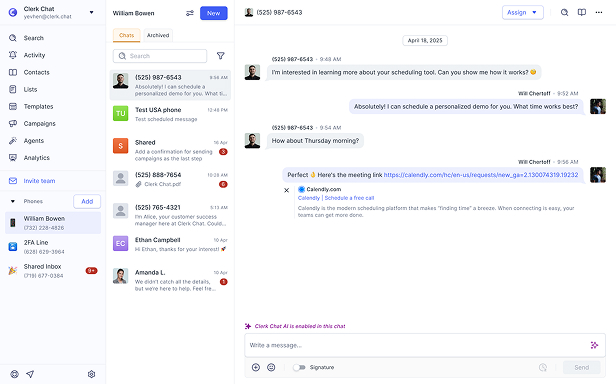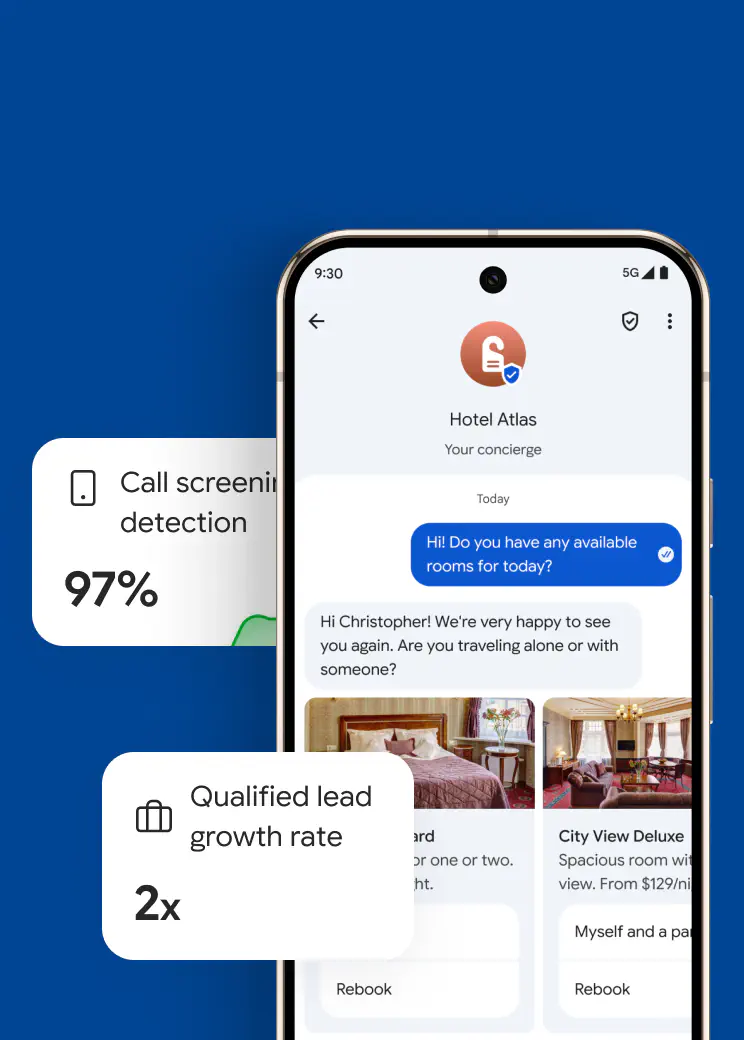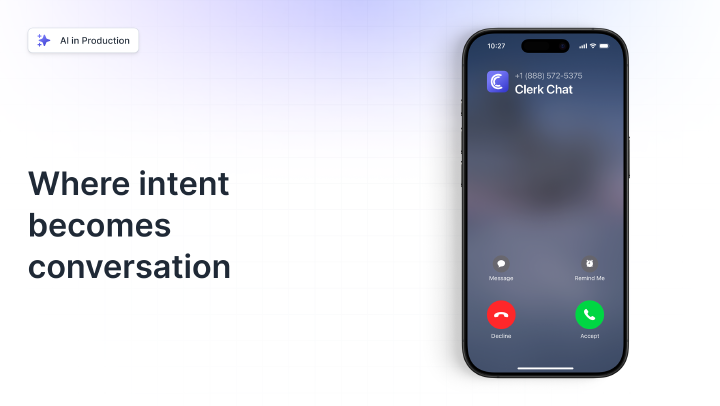Top Conversational AI Platforms for 2025: Smart Picks & Insights
By Alexander Haque
- Updated: July 15, 2025
The interactions between businesses and consumers are changing. Where customers used to wait on hold, or bounce between support forms, they’re now talking to systems that can understand what they need, and get it done. Conversational AI platforms are driving that shift.
These tools are still evolving, but companies are already discovering the benefits. Leading conversational AI solutions are fast, responsive, and getting better by the day. They’re helping teams do more without hiring more, and making it easier for people to get help, buy, or resolve an issue without hitting a wall.
It’s easy to see why experts predict the market for conversational AI will be worth more than $49.9 billion by 2030. But even as adoption continues to grow, some business leaders are still left wondering how to dive in.
This guide breaks down what these platforms are, how they work, and what to look for if you’re building one into your stack.
In this article:
What are Conversational AI Platforms?
Conversational artificial intelligence (or conversational AI) is the term used to refer to technology that enables computer systems to understand and respond to human interactions. Basically, conversational AI can communicate with people in a “natural” way.
Conversational AI platforms are the software solutions that make it easy to create, train, access, and fine-tune conversational AI tools, like sophisticated chatbots, voice bots, and virtual assistants.
These solutions allow companies in various industries to experiment with pre-built bots, design their own intelligent interactive tools, and embed conversational AI into various processes, from marketing and sales tasks, to customer service.
Some platforms offer prebuilt options for common tasks. Others let you create something more tailored. The good ones make this possible without needing an engineer on standby.
They’re used for more than just chat. Enterprise conversational AI shows up in voice calls, SMS flows, backend ops, even internal support. The point isn’t to do everything. It’s to remove friction: the stuff that slows teams down or clogs up service queues.


Conversational AI vs Chatbots
The term “Chatbot” still makes most people think of the clunky rule-based systems. The ones that ask three times if you want to speak to a human, then never connect you.
Notably, while conversational AI platforms allow users to build and train chatbots – the bots you’ll create with these tools aren’t the same as the old-fashioned bots you might be familiar with. In the battle between conversational AI vs traditional chatbots, conversational tools are more intelligent.
They’re built to work in real time. Across more than one channel, and minimize repetition. The line between generative AI vs conversational AI is blurrier now too. Some platforms blend both into a single system. Many modern tools are even “multimodal”, which means they can understand and generate various types of content, from audio and images, to voice and text.
Chatbots vs Large Language Models
Here’s where the terminology starts to get more confusing.
You’ve seen the LLMs: ChatGPT, Google Gemini, Microsoft Copilot. These tools can write essays, summarize meetings, draft emails, answer questions. These LLMs form a crucial part of what makes conversational AI systems more effective than old-fashioned chatbots.
But it takes more than just an LLM to power conversational AI platforms. On their own, LLMs aren’t always built for structured tasks like walking someone through an insurance claim or checking the status of a return. That’s where chatbot training and tight context windows still matter.
LLMs can understand nuance. They’re flexible. But they’re also harder to control. If you need predictable answers, they need to be paired with the right guardrails, and often, multiple models working together. One might focus on facts, another on tone, another on logic.
What most companies are doing now is blending tools: using an LLM for flexible dialogue, and a rule-based system underneath to make sure the answers stay on track.
Script-based chatbots are limited, but safe. LLMs are powerful, but messy. The middle ground is where most AI agents live now.
How Does a Conversational AI Platform Work?
As more companies continue to leverage conversational AI for customer service, sales and marketing tasks, the number of AI platforms is increasing. Each platform offers distinct features and benefits, but most solutions feature the same central components, such as:
1. Input Interface
This is where the interaction begins, through a chat window, a help desk widget, or voice command. Text inputs get parsed directly. For voice, the system uses automatic speech recognition (ASR) to turn audio into usable text.
2. Language Understanding
Next, the system applies natural language processing (NLP), specifically, natural language understanding (NLU), to make sense of the input. It doesn’t just pick out keywords. It looks at context, phrasing, and structure to guess what the user’s trying to do. Is this a password reset? A complaint? A product question? That intent gets passed downstream.
3. Reasoning & Decisioning
Once intent is identified, logic kicks in. Some conversational AI platforms use structured workflows. Others lean on reasoning models and deep learning functionalities. This part handles things like routing, form-filling, or triggering next steps. In more complex platforms, it may also involve arbitration and escalation management, where the system decides if it should continue autonomously or hand off to a human.
4. Language Generation
Then comes the response. Some conversational AI solutions use static replies. Others generate responses dynamically, using LLM-powered Q&A. This allows bots to match your tone, pull data from your CRM, or surface help content with better accuracy. This is where ai-enabled engagement starts to feel less scripted and more natural.
5. Arbitration and escalation management
If the request can be resolved automatically, the system runs in autopilot mode. AI agents get to work confirming, closing, or scheduling without manual input. But if the issue’s too complex or confidence is low, it hands off to a human, often with full context included.
Conversational AI Platform Use Cases
So, how can companies use conversational AI software? By far, the biggest “use case” for conversational artificial intelligence is in customer service. However, AI-powered virtual assistants can help with more processes than you might think.
Customer Service & Self-Service
AI bots with conversational AI capabilities can understand customer queries, troubleshoot and address problems, and even complete various tasks. For instance, with conversational AI in the insurance industry, companies could give every customer access to an always on assistant that can help them choose the right policy, or submit claims.
Conversational AI for financial services teams can help customers proactively share investment insights with customers, or address service requests. In retail, a conversational AI platform can allow companies to create bots that send personalized offers to customers, or help them troubleshoot account issues, and track orders.
The best platforms support contextual fallbacks, so when something doesn’t work, the bot doesn’t freeze, it adapts. With multichannel support, customers can start on chat, switch to SMS, and still pick up where they left off.


Sales & Commerce
The great thing about conversational AI is that it can help enhance every stage of the customer journey, from helping you generate marketing content (check out our SMS marketing best practices here), to helping buyers find the product or service that’s right for them.
Sales teams use these bots to book demos, qualify leads, and follow up automatically. In ecommerce, conversational AI agents surface product recommendations, answer sizing questions, and manage delivery updates.
After a purchase, conversational bots can troubleshoot and resolve common problems in real-time, enhance self-service interactions, and even increase future sales by sending targeted promotions to buyers based on their purchasing history.
Internal Support & Agent Assist
It’s not just about helping customers; conversational AI platforms enhance customer and employee workflows at scale. Agent assist tools are quietly transforming internal workflows. A rep on a call can get live suggestions, links to knowledge base articles, or auto-summaries of the last conversation, all without toggling tabs.
With feedback intelligence and real-time logs, managers can track how helpful those suggestions actually are. Some companies even allow team members to build their own AI tools to help with specific tasks.
No-code conversation builders and seamless backend integrations with CRMs, ticketing tools, and internal databases make it easier to build out entire teams of AI agents.
Research & Analytics
Many teams now use bots to collect user insights at scale. They can collect product feedback, automate CX scoring, or streamline friction point detection. With tools like conversational analytics, it’s possible to surface common drop-off points, confusing UI flows, or gaps in agent scripts.
Advanced tools can go beyond intent recognition, understand consumer sentiment, and pull trends from live chat conversations or recordings. This helps businesses make better decisions, upgrade feedback intelligence, and boost productivity.
The Benefits of Conversational AI Platforms
The benefits of enterprise conversational AI tools are phenomenal. The right technology can streamline and improve marketing and sales strategies, and enhance customer experiences. Plus, conversational AI technology can make teams more efficient and productive too.
According to a Salesforce report, around 77% of customer-facing agents believe that automation and AI tools can help them achieve more in their roles.
Some of the biggest benefits of conversational AI include:
Improved Operational Efficiency
AI tools for customer support, sales, and service tasks save employees crucial time. They can automate countless tasks, from conducting research, to sourcing customer feedback, transcribing conversations, and generating sales or marketing content.
Because conversational AI can handle repetitive tasks, it gives human agents more freedom to focus on other valuable, creative, and strategic processes, such as handling complex service requests.
Enhanced Customer Experiences
Customers don’t want to wait. They want answers. And if a tool can give them that in 30 seconds at midnight, they remember it. Conversational AI allows every company to deliver 24/7 support to customers, meaning they can improve customer service response times, minimize queues, and increase loyalty.
Top conversational AI platforms even allow companies to create bots that can interact with customers on a range of channels, from phone systems, to chat interfaces on a website, SMS, and more.
Higher Profits and Revenue
By enhancing customer experience with conversational AI solutions that can personalize, streamline and simplify interactions, companies increase their chances of retaining clients – improving long-term profitability. However, AI tools can boost profits in other ways too.
For instance, developing conversational marketing strategies with insights from a CRM platform can help businesses to deliver personalized product recommendations to customers at crucial points in their purchasing journey – increasing average order values.
Reduced Operational Costs
While conversational AI doesn’t eliminate the need for human employees in any workplace, it does help organizations to accomplish more with less. With the right platform, businesses can scale customer support, sales, and marketing operations without hiring additional agents.
Conversational AI tools also make it easy to manage sudden surges and changes in customer demand and queries, reducing a company’s risk of missing out on opportunities for growth.
Stronger Business Insights
Data is crucial to growth in any organization, and conversational AI tools are excellent at collecting data and converting it into actionable insights. By transcribing and analyzing recorded interactions, companies can use conversational AI for sales teams to identify better sales strategies.
Conversational tools can also provide businesses with insights into customer trends, preferences, and pain points, helping them to develop better products, or customer service methodologies.
Key Features of Conversational AI Solutions
There’s no universal checklist when it comes to conversational AI platforms. What works for a global ecommerce company might not suit a regional bank or a healthcare helpdesk. But there are a few core features you’ll want to look for, especially if you plan to scale, integrate, or support users across multiple channels.
Here’s what actually matters:
Multilingual Support
If you’ve got customers in more than one region, or even just in one major metro, you’ll probably need multilingual support. The best platforms don’t just translate words; they understand tone, slang, and intent in different languages.
Strong natural language processing (NLP) capabilities should let your bot handle customer interactions with mixed inputs too, like a sentence that starts in English and ends in Spanish (it happens).
Multichannel Support
Customers don’t stick to one platform. Your support tools shouldn’t either. Look for a solution with true multichannel support, meaning it works across web chat, SMS, social DMs, voice, and even apps.
Good platforms let a customer start in one place and pick up in another, without repeating themselves. That’s where solid backend integrations and session tracking come into play.
Intent Recognition
The best conversational AI software needs to be accurate. That starts with intent recognition: how well the platform figures out what someone is trying to do, even if they don’t say it cleanly.
Better dialog engines learn from examples, not just rules. And they improve over time with exposure to real-world queries.
Customization
If every change requires a developer, your team won’t use the system. A good no-code builder means your ops or CX lead can tweak flows, update language, or fix logic without filing a Jira ticket.
This becomes even more important when you’re managing multiple bots, or making quick changes during busy seasons. Some solutions even enable contextual fallbacks, and routing patterns based on your specific workflows.
Backend Integrations
Your AI shouldn’t live in a silo. Strong platforms come with prebuilt backend integrations to CRMs, helpdesks, analytics tools, product catalogs, and knowledge bases. If integration is an afterthought, expect delays, duplication, and a lot of “I’ll have to transfer you.”


Generative AI Integration
Some bots still rely on decision trees. That’s fine for simple tasks. But if you want something more natural, say, summarizing a policy or writing a follow-up message, you’ll want generative AI integration. The best tools let you blend structured logic with open-ended answers, without losing control over tone or accuracy.
Feedback Intelligence & Conversational Analytics
You need to know what’s working and what isn’t. Look for built-in feedback intelligence features: survey prompts, drop-off tracking, query logs. Paired with conversational analytics, this data helps you iterate quickly, spot training gaps, and prove ROI when budget season hits.
Conversational AI Software: Costs and Pricing Models
Pricing for a conversational platform can vary. Exactly what you can expect to pay depends on things like how many people you’re serving, how complex your use cases are, and how deeply you plan to integrate the platform into your systems.
Here’s a breakdown of what typically affects the cost structure, and where the trade-offs show up.
- Free Plans & Entry-Level Tiers: Many platforms offer a free plan or trial tier, good for testing the waters, building a proof of concept, or experimenting with internal use cases. Just be careful with usage limits. You might get 500 messages or 1,000 monthly interactions for free, but that cap can hit faster than you expect if traffic spikes or your bot starts handling multi-step flows.
- Creator Accounts vs Enterprise Contracts: Some tools follow a SaaS model with monthly pricing per creator account, ideal for small teams or startups. Others push you toward a broader premium option with enterprise contracts, which often include SLAs, advanced features, and white-glove onboarding.
- Customization and Integration Complexity: Want a basic chatbot on your homepage? That’ll be cheaper than building an AI-powered assistant that plugs into five systems and speaks three languages. The more customization and integration complexity you’re managing, the more likely you’ll be quoted a custom price.
- Scale of Deployment: Many conversational AI platforms bill based on volume: how many conversations per month, how many users, or how many messages processed. If your bot sees heavy traffic, or if you’re building an assistant that spans multiple departments, costs can scale quickly.
Conversational AI Software: 13 Top Solutions for Enterprises
So, which are the top conversational AI platforms worth considering today? We’ve examined some of the top contenders in the current market, to bring you this insightful list.
1. Clerk Chat: The Leading Conversational AI Platform
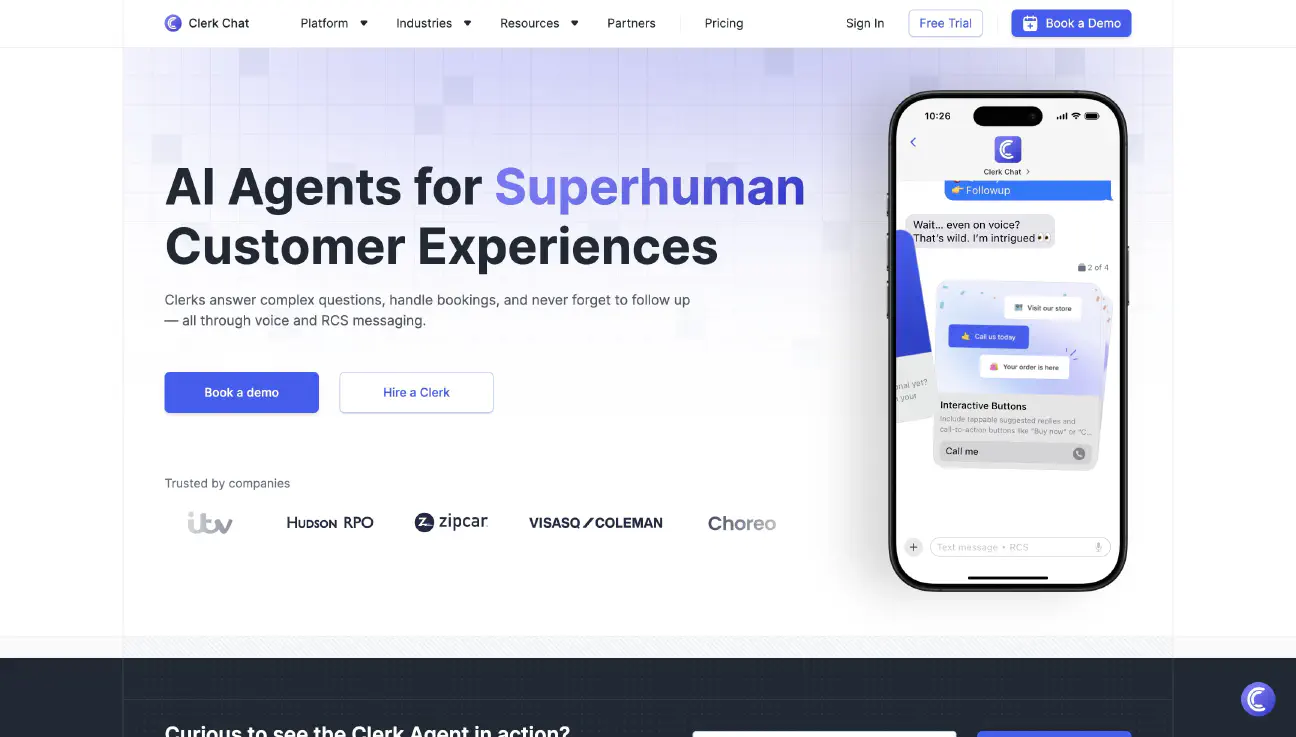
If you’re looking for a leading conversational AI platform ideal for everything from streamlining customer service, to enhancing marketing campaigns, Clerk Chat is the perfect solution. This all-in-one platform isn’t just the top tool for business messaging, it’s one of the most impressive systems in the AI world, offering access to AI-powered text messaging, and omnichannel interactions.
With Clerk Chat, you can create a custom bot that can respond to and support customers on any channel of their choosing, from SMS, to iMessage, WhatsApp, RCS, and beyond.
Plus, since Clerk Chat integrates with your existing tools, you can fine-tune your bot with knowledgebase data, and even empower it to draw insights from your CRM to personalize each discussion. Organizations in retail, finance, healthcare, and beyond are already using Clerk Chat’s intuitive tools to automate workflows with SMS, create more compelling marketing campaigns and gather customer feedback.
Clerk Chat’s bots can even book appointments and handle transactions automatically, allowing your teams to focus more of their attention on other, complex tasks.
Beyond that, Clerk Chat prioritizes SMS compliance best practices, and data security, to give your company and customers peace of mind.
Pricing
Prices for Clerk Chat’s platform start at $9.99 per month, with access to unlimited messages and bring-your-own carrier capabilities.
| Pros | Cons |
|---|---|
| • Customizable AI assistant with NLP, NLU, and machine learning | • No long-term free plan |
| • Automated workflow builders to support a range of tasks | |
| • Integrations with dozens of business tools | |
| • End-to-end compliance and security features | |
| • Intelligent reporting and analytics | |
| • Omnichannel support for sales, marketing, and customer service |
2. IBM WatsonX Assistant: Great Voice Recognition
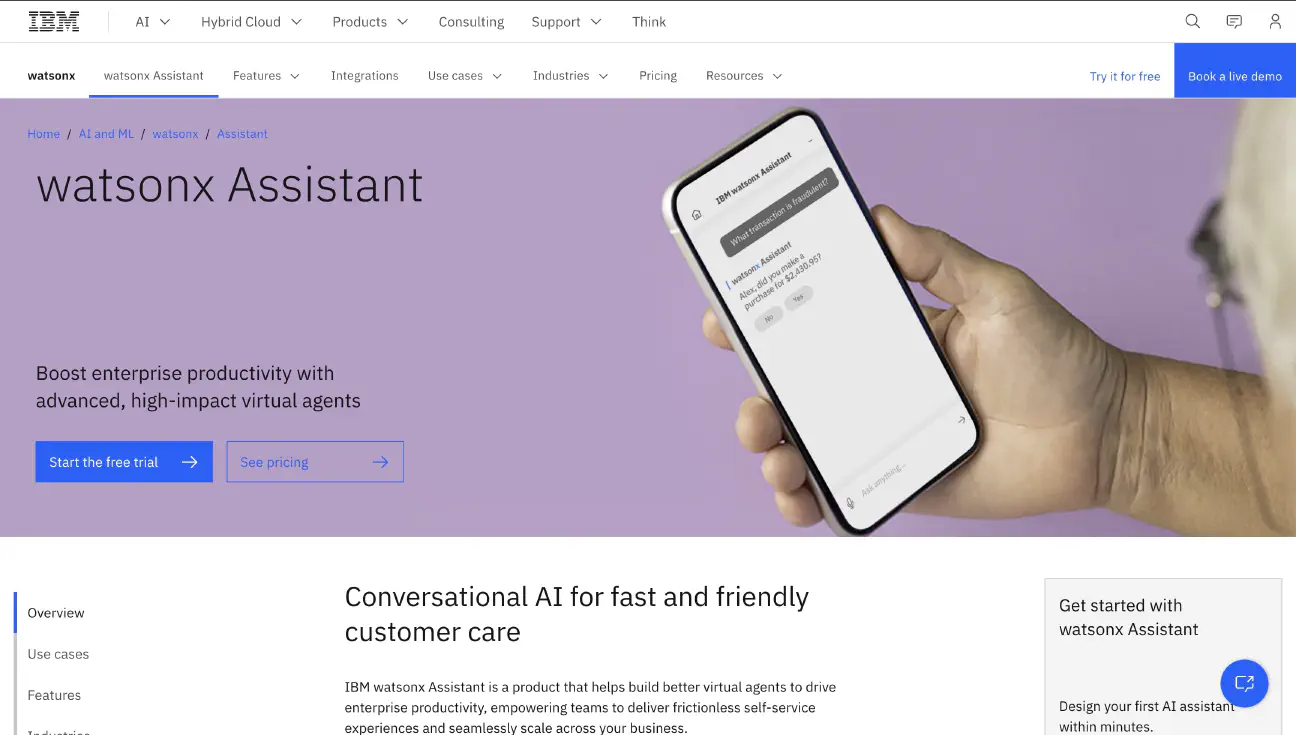
IBM is one of the most reliable market leaders in the AI landscape, responsible for a range of conversational AI platforms, tools, and applications. The IBM WatsonX assistant gives organizations a toolkit they can use to create automated chatbots and advanced AI agents.
With IBM, companies can infuse bots with their own business data, and even implement strict governance and security rules. That’s crucial for highly-regulated companies looking to take advantage of the rise of conversational banking or healthcare solutions.
WatsonX has advanced NLP and intent recognition capabilities, and also makes it easy to seamlessly enable bot-human handover processes for contextual conversations. Plus, you can create agents that can understand various types of human input – from written text to spoken voice.
Pricing
IBM WatsonX can be a little expensive depending on the size of your business. Prices start at around $140 per month for up to 1,000 users, although a free “lite” version is available to some customers.
| Pros | Cons |
|---|---|
| • Seamless bot-human handover capabilities | • Complicated initial setup |
| • Multi-lingual text and voice interaction support | • Limited integrations compared to some competitors |
| • Easy to integrate with various enterprise data sources | • Can be expensive to scale |
| • Advanced NLP and intent recognition capabilities | |
| • Access to unique data sets |
3. Kore.AI: Excellent for No-Code Development
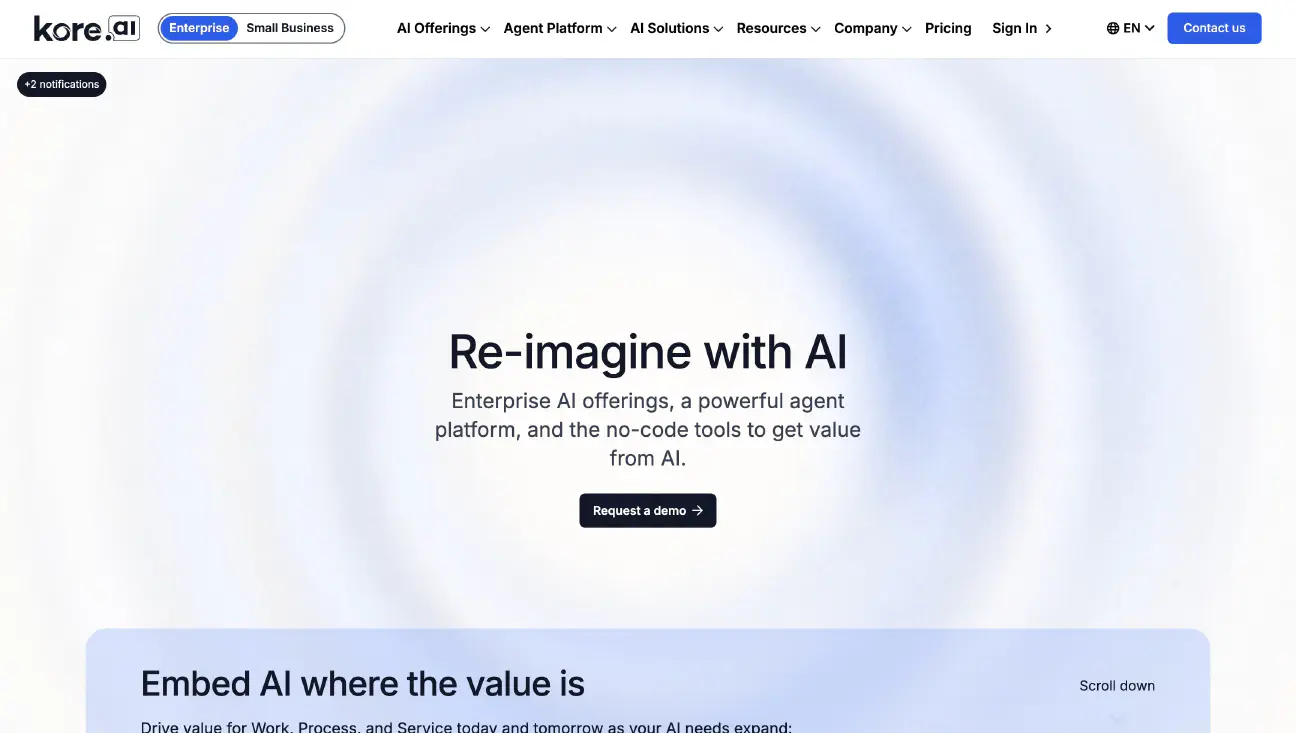
Kore AI is another of the top conversational AI platforms allowing enterprise users in various industries to create bots that enhance both customer and employee experiences. Whether you’re focusing on delivering exceptional customer service in the financial industry, or you want to streamline customer service tasks in the retail space, Kore.AI has you covered.
The platform includes advanced natural processing capabilities for over 100+ languages, and allows organizations to seamlessly deploy bots across various channels. For instance, you can create bots that can integrate into voice systems, messaging apps and more. There’s also a fantastic toolset for monitoring the results of each AI conversation.
The best thing about Kore AI, however, is its simplicity for people with limited coding and technical knowledge. You don’t need any prior programming experience to start building self-learning chatbots. The only time you might need extra support is if you want to take advantage of complex integrations.
Pricing
Kore.AI’s pricing varies depending on the tools you need, and how many customers or agents you need to support. Plans for “contact center AI” assistants start at around $29 per agent per month – although you do need to pay extra for voice add-ons.
| Pros | Cons |
|---|---|
| • Excellent no-code bot and intelligent assistant builder | • Voice interaction capabilities are limited (And can cost extra) |
| • Omnichannel support | • May be more expensive than some conversational AI tools |
| • Intent recognition and natural language understanding in multiple languages | |
| • Comprehensive monitoring and optimization toolset | |
| • Lots of customization options |
4. Amazon Lex: Best for AWS Customers
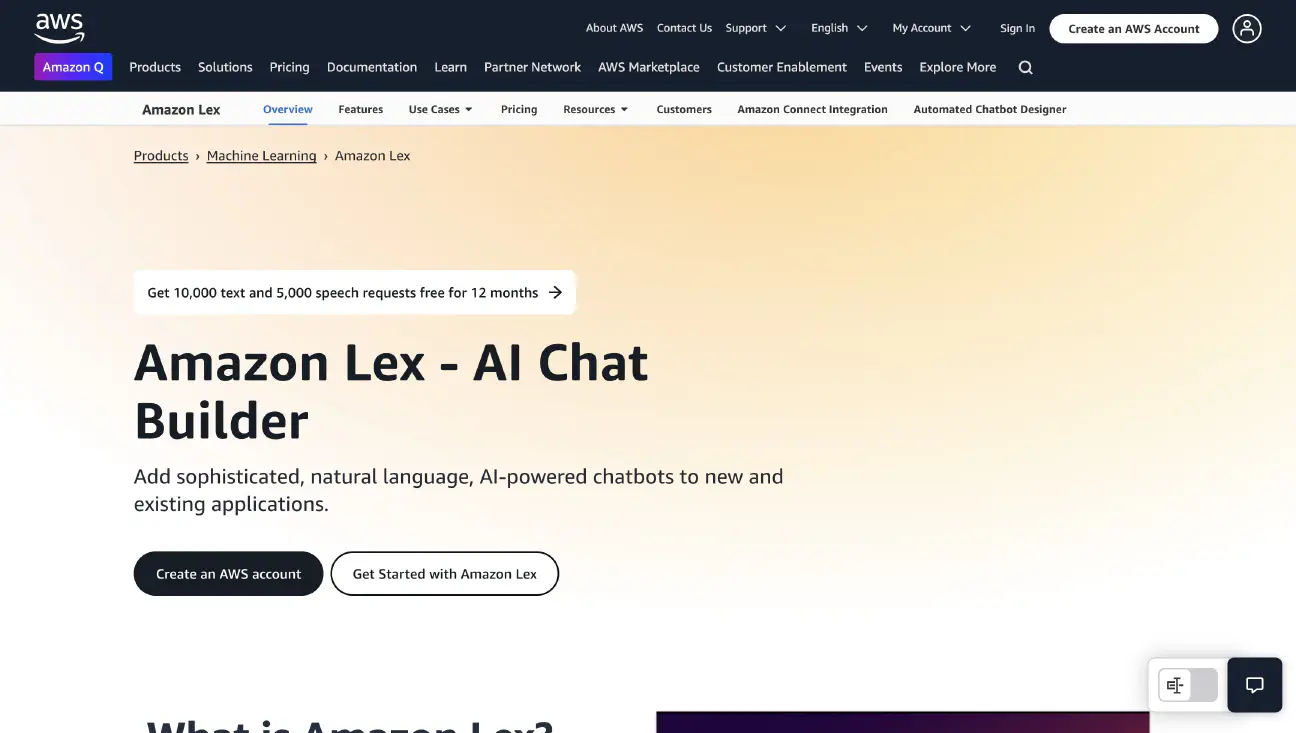
Amazon Lex is an end-to-end AI service that allows companies to build conversational interfaces into any application, with support for voice assistants and text. It may be a little complex for some beginners in the industry, as it’s designed specifically for developers who want to build more sophisticated, bespoke chatbots, and autonomous agents.
Lex leverages some of the most advanced AI technology in the world, enabling access to natural language understanding, automatic speech recognition, and deep learning functionality. What makes it particularly compelling for companies already using AWS technologies, is its deep integration with the AWS ecosystem of services.
Lex connects seamlessly to solutions like AWS Lambda and Amazon Polly, allowing companies to create bots that can handle complex conversations, and draw on vast amounts of data. Amazon Web Services also prioritizes compliance and security, so companies can tap into the benefits of conversational messaging and customer service with fewer risks.
Pricing
Amazon’s pay-per-use model means that companies pay for each “speech request” and “text request” their bots need to process. Although the pricing is relatively transparent, you can end up paying quite a lot depending on the size of your business, and the number of customers you serve.
| Pros | Cons |
|---|---|
| • State of the art AI and NLP capabilities | • Limited customization options compared to some alternatives |
| • Tight integration with the full AWS ecosystem | • High learning curve for beginners |
| • Support for multiple languages and text/speech recognition | |
| • Integrated user authentication and authorization features | |
| • Excellent customer support |
5. Boost.AI: Best User-Friendly Option
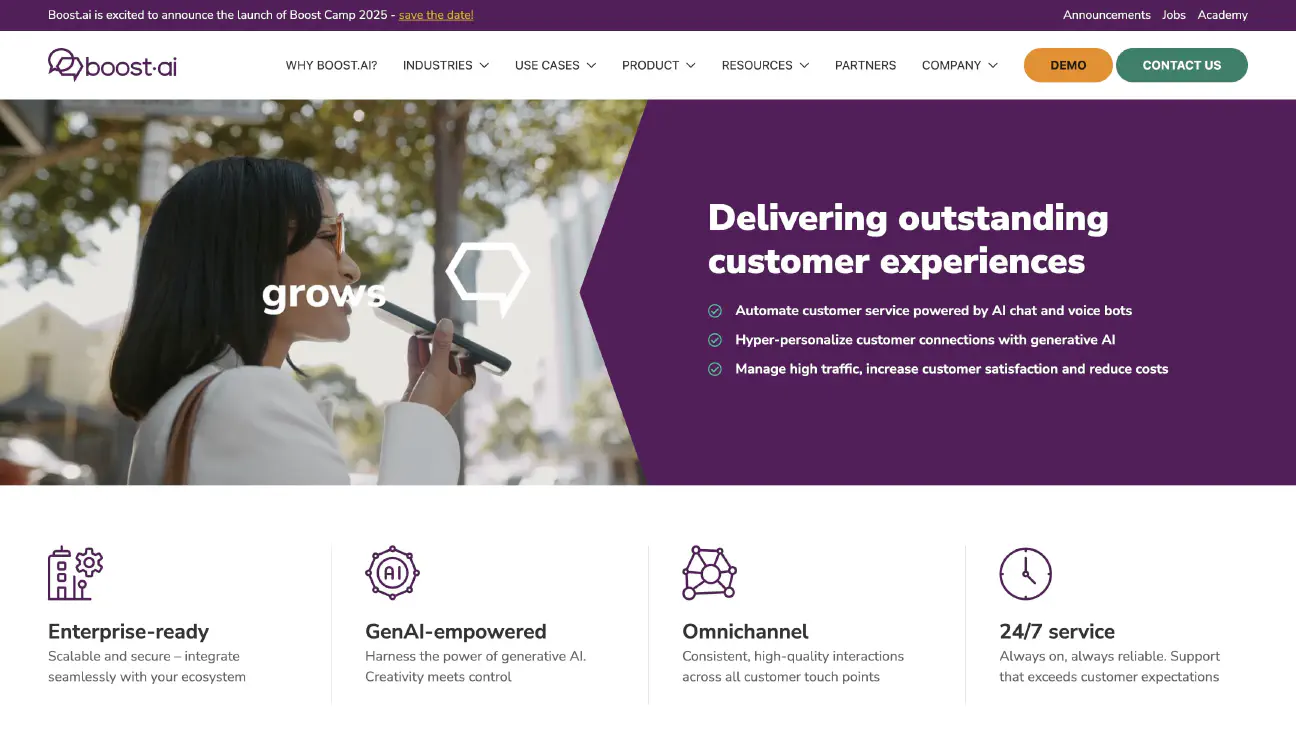
If you’re looking for an easy way to access conversational AI software, Boost.ai could be a great choice. This platform makes it easy for any company to build a custom AI solution in just a matter of days, complete with conversational and generative AI capabilities.
Boost.AI bots are ideal for multi-channel deployment, allowing companies to support customers across various touchpoints, from voice to messaging apps. Plus, it’s AI system is “self-learning”, which means it can constantly draw insights from conversations to enable regular performance improvements.
One of the great things about Boost.AI, is that you can use the platform to create various agents for different use cases. For instance, you can design customer-facing AI tools for service and support, as well as “agent assistance” tools for internal teams.
Pricing
Boost doesn’t share any direct pricing information on its website. You’ll need to reach out to the sales team for a custom quote based on the type of AI solution you want to build.
| Pros | Cons |
|---|---|
| • Quick and simple chatbot builder | • Fewer integration options than some alternatives |
| • Omnichannel support | • Content filtering can be complex |
| • Self-learning AI for constant improvements to performance | |
| • Multiple bot design options | |
| • Excellent customer support – particularly for enterprise companies |
6. Google Dialogflow: Best for Strict AI Controls
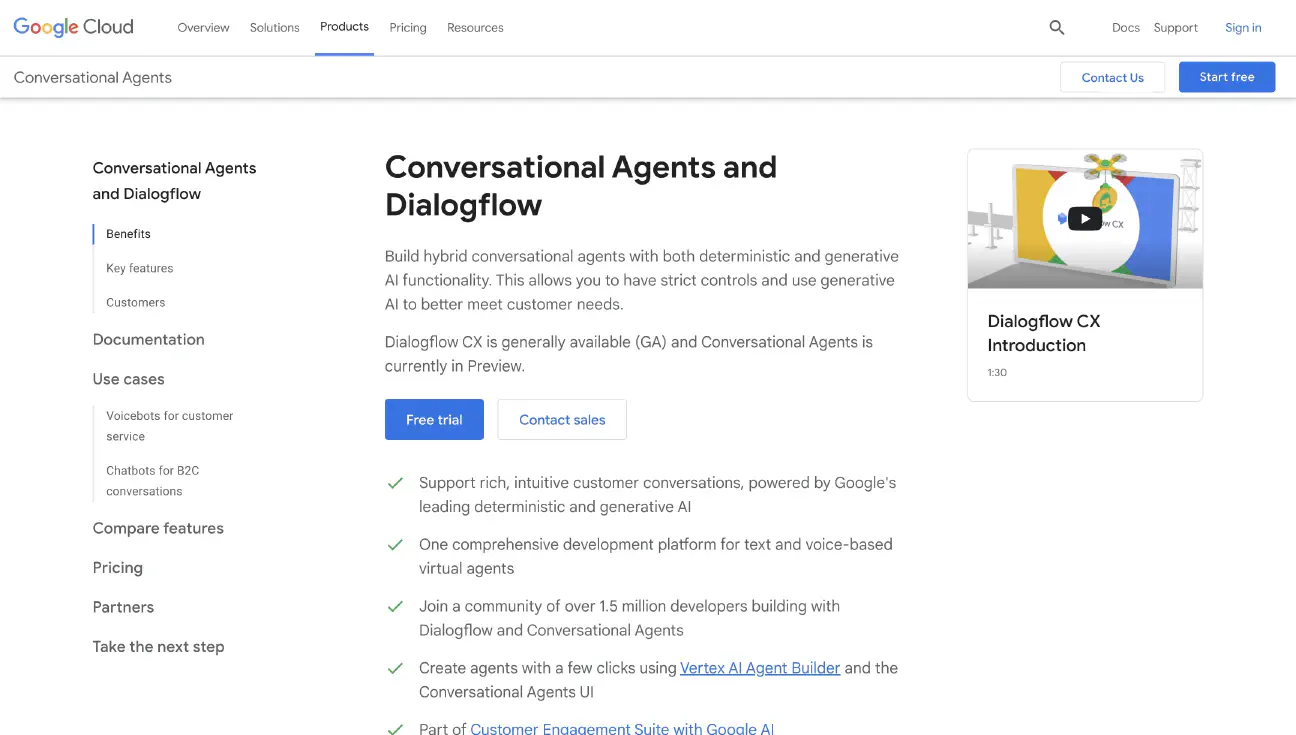
Google Dialogflow is a comprehensive toolkit which allows companies to build hybrid conversational AI agents with generative and deterministic AI functionality. This basically means you can maintain more control over how your bots respond to customer queries.
As one of the most popular conversational AI platforms, Dialogflow has helped countless companies discover AI’s impact on healthcare marketing, financial customer service, and more. You don’t even need a lot of technical experience to start building bots, thanks to the intuitive Vertex AI Agents builder, Gemini chatbot APIs, and developer tools.
Dialogflow supports text and voice-based virtual agents, and makes it easy to fine-tune your agents with your own workflows and data. You even get access to advanced tools, like automated systems for determining customer satisfaction rates.
Pricing
Google Dialogflow offers a free tier for beginners with limited usage, followed by “per-usage” pricing – starting at $0.002 per request.
| Pros | Cons |
|---|---|
| • Excellent security and guardrail features | • Limited customization options compared to some alternatives |
| • Seamless integrations with other Google services | • Can be expensive to use as usage begins to scale |
| • Easy-to-use interface for developing conversational flows | |
| • NLU support in more than 20 languages | |
| • Fantastic, advanced features |
7. Sprinklr: Excellent for Conversational Commerce
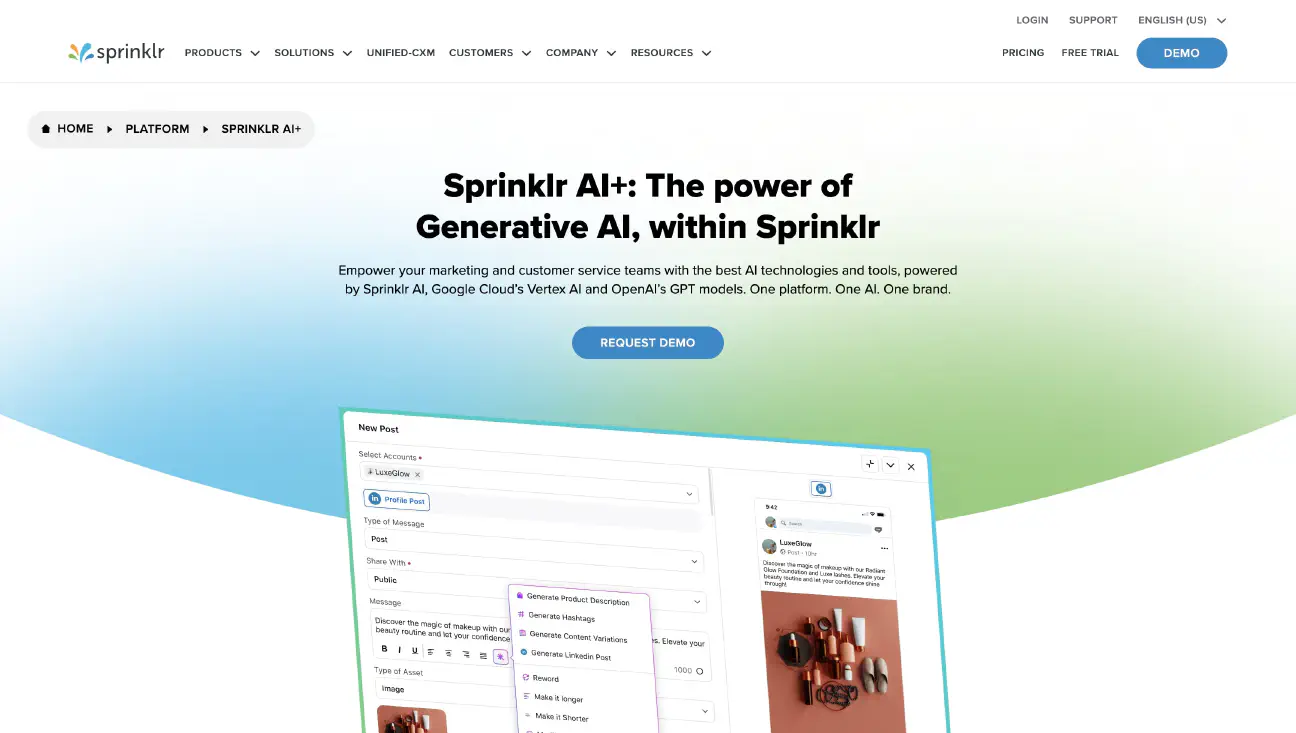
Sprinklr is a unified “customer experience” management tool, that doubles up as a conversational AI platform. This platform empowers companies to create custom chat and voice bots, ideal for handling a wide range of customer service scenarios on various channels.
As a leader in conversational commerce technology, Sprinklr’s platform is ideal for companies that want to create bots that can deliver personalized product recommendations to customers, guide them through shopping experiences, and complete transactions.
This platform is also fantastic at giving organizations insights into their target audiences and their purchasing journeys. With the platform you can use insights from conversations to rapidly identify net promoter scores, customer satisfaction scores, and more. You can even filter through conversations by themes and sentiment scores.
Pricing
Sprinklr is one of the more expensive conversational AI platforms on this list, with plans starting at $199 per month, per user. There are also additional fees to pay if you want to use Sprinklr’s tools on certain channels, like SMS and voice platforms.
| Pros | Cons |
|---|---|
| • Fantastic conversational commerce features | • Expensive pricing |
| • Easily customizable bots that integrate with existing business tools | • Occasional technical bugs |
| • Omnichannel support | |
| • Automated CSAT and NPS surveys | |
| • Excellent analytical and reporting features |
8. Cognigy AI: Exceptional Accuracy
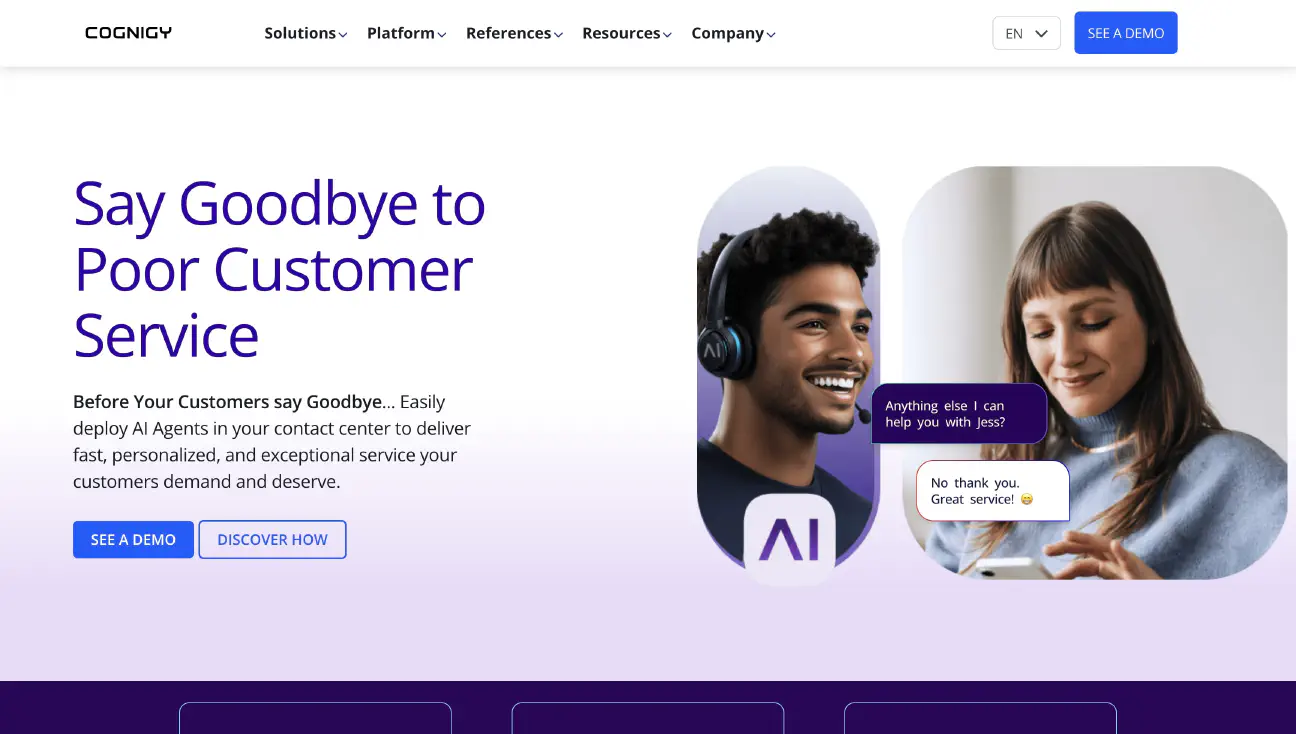
Cognigy is a market leader in the world of conversational AI platforms, as well as generative AI tools, and autonomous agent development. This company ensures organizations from any industry can build advanced virtual assistants for marketing, sales, and customer service.
With Cognigy’s low-code conversational AI platform, you can create IVR systems that can immediately support callers with complex requests, as well as smart self-service and agent assist tools. Plus, the Cognigy conversational AI software is fantastic for large global enterprises, with support for more than 100 languages and real-time translation.
Cognigy is a great choice if you primarily support customers on voice-based platforms, with its empathetic lifelike voice models, and accurate routing capabilities. However, it can be more difficult to leverage if you’re using other channels, like text messaging for business communications.
Pricing
Like some of the other top enterprise conversational AI platform providers on this list, Cognigy doesn’t share transparent pricing information on its website. You’ll need to contact the company directly for a custom quote.
| Pros | Cons |
|---|---|
| • Excellent voice AI features | • No transparent pricing |
| • Intuitive and easy-to-use solution for beginners | • Not ideal for some customer support and marketing channels |
| • Lots of convenient integrations | |
| • Multilingual support for global companies | |
| • Integrated real-time translation |
9. Microsoft Copilot Studio: Great for Microsoft Fans
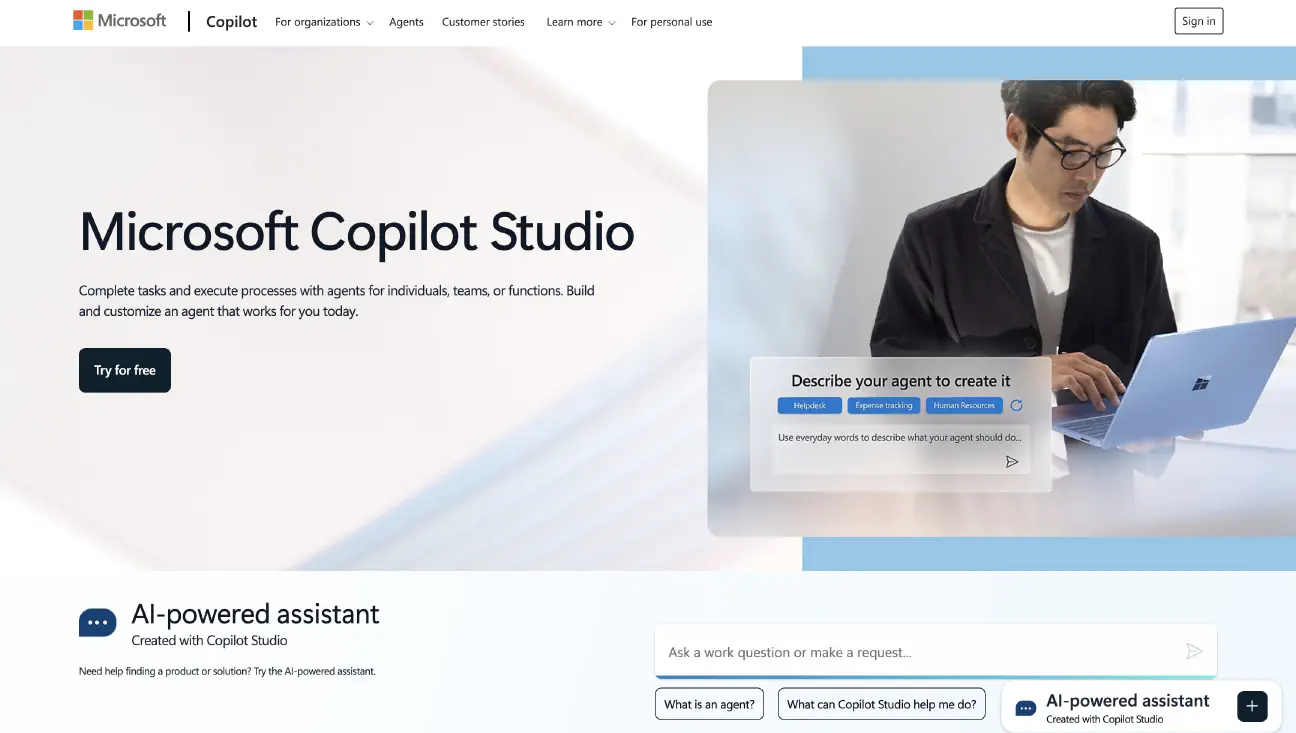
Copilot Studio is Microsoft’s internal conversational AI platform, designed to help companies build smart assistants directly into the Microsoft apps they already use, like Teams, Outlook, or SharePoint. There’s also a comprehensive AI agent marketplace where companies can discover pre-built bots developed by Microsoft partners.
If you’re starting from scratch, you can use Copilot Studio to design bots using natural language prompts or a visual builder, and connect them to your company’s data using retrieval-augmented generation (RAG). It’s well suited for creating AI agents that handle internal requests, generate documents, or guide workflows, without switching platforms.
While Copilot Studio is strong on internal automation, it’s less focused on external chatbot deployment, and works best in Microsoft-centric environments.
Pricing
Pricing for Microsoft Copilot Studio varies depending on your deployment needs. There are pay-as-you-go options, and message packs starting at $200 per tenant, per month.
| Pros | Cons |
|---|---|
| • Strong integration with Microsoft apps | • Less flexible for public-facing chatbots |
| • Easy-to-use no-code builder | • External integrations can be limited |
| • Built-in access to Microsoft Graph data | • Authentication requirements for many use cases |
| • Supports agentic AI for internal workflows | |
| • Works well for internal teams and operations |
10. Amelia (SoundHound): Voice-First Conversational AI with Agentic Capabilities
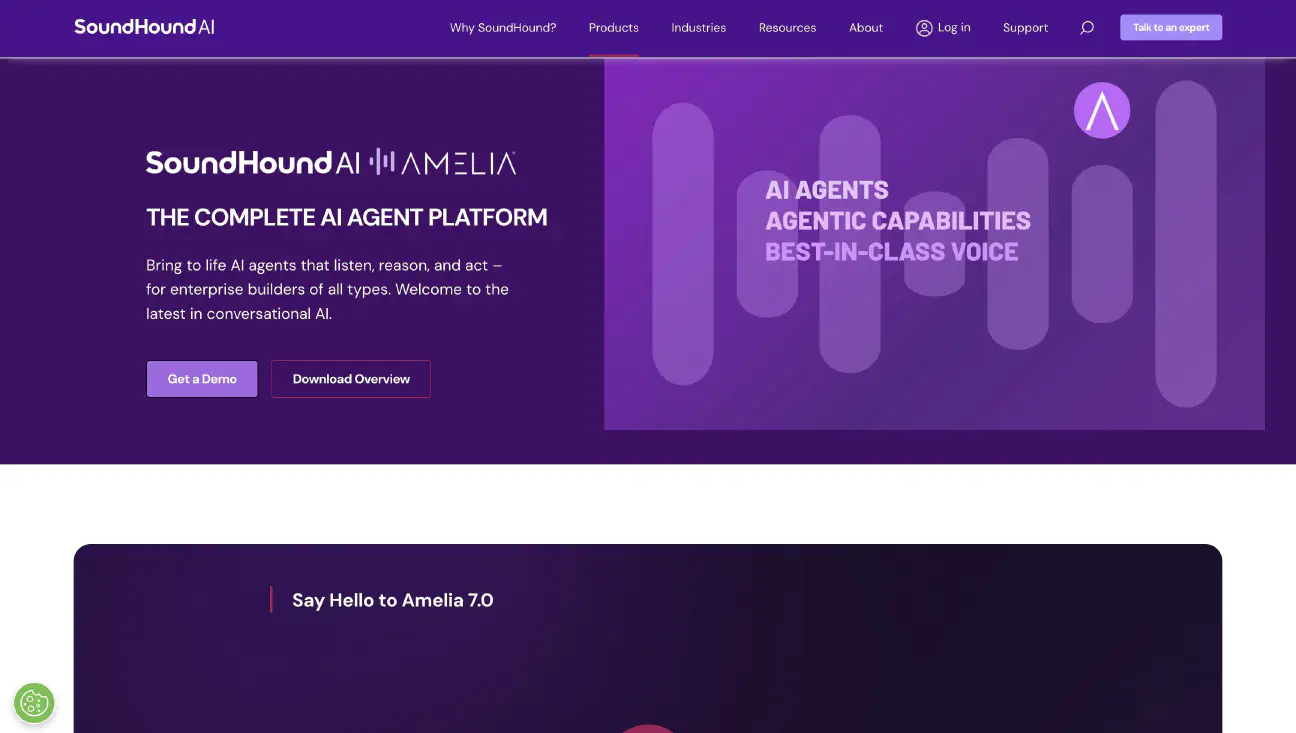
Amelia is a robust, enterprise-ready conversational AI platform built for complex voice and text interactions. It supports more than 100 languages, and is designed around agentic AI principles, meaning bots can reason, learn, and act across channels.
The platform includes an empathetic voice assistant engine, strong intent recognition, and seamless dialog designs for customer service, IT help desks, and sales operations. It also includes options for contact center transformations and backend process automation.
Plus, you can create custom bots designed for agent assist tasks, and integrate your tools with the knowledge systems your employees already use. On top of that, companies can build in their own LLMs, and generative AI features. So you don’t have to worry about a complex generative AI vs conversational AI model debate.
Pricing
Custom quotes based on use case and scale.
| Pros | Cons |
|---|---|
| • Strong AI orchestration for complex tasks | • UI can feel dated in parts |
| • Designed for global, multilingual support | • Less flexible for low-code users |
| • Built-in integration with major CRMs and ITSM tools | • Advanced features require careful tuning |
| • Good fit for regulated, high-stakes environments |
11. Verint DaVinci: Modular Bots for Enterprise CX
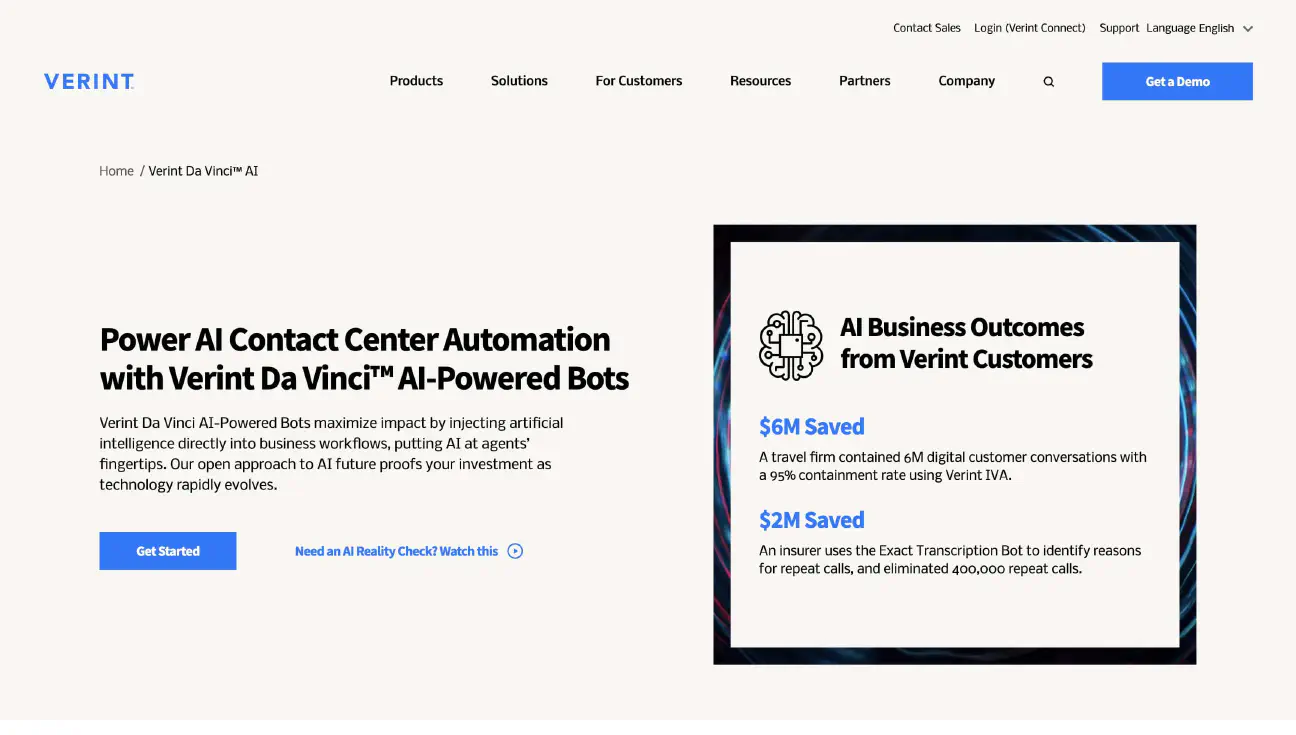
Verint’s DaVinci AI suite is a conversational AI enterprise platform built for customer experience, with a focus on large enterprises that need enterprise chatbots embedded into multiple workflows. It’s more of a “bot factory” than a chatbot tool, offering modular components that can be deployed across voice, web, and mobile.
The platform supports self-learning chatbots, voice assistants, and extensive conversational analytics. It also includes fraud detection tools, agent assist features, and automated QA capabilities, all built to scale across global contact centers.
Verint’s “Engagement data Hub” is particularly useful for companies looking to train their own bots on interaction, workforce, and experience data they’ve already collected.
Pricing
Based on contract scope and add-ons; not publicly listed.
| Pros | Cons |
|---|---|
| • Designed for complex customer service environments | • Requires IT support for implementation |
| • Modular bot architecture | • Advanced setup takes time |
| • AI-driven feedback intelligence and compliance reporting | • May be overkill for smaller orgs |
| • Seamless multi-channel deployment | |
| • Strong security and governance tools |
12. OneReach.ai: Flexible Automation with No-Code Flow Builder
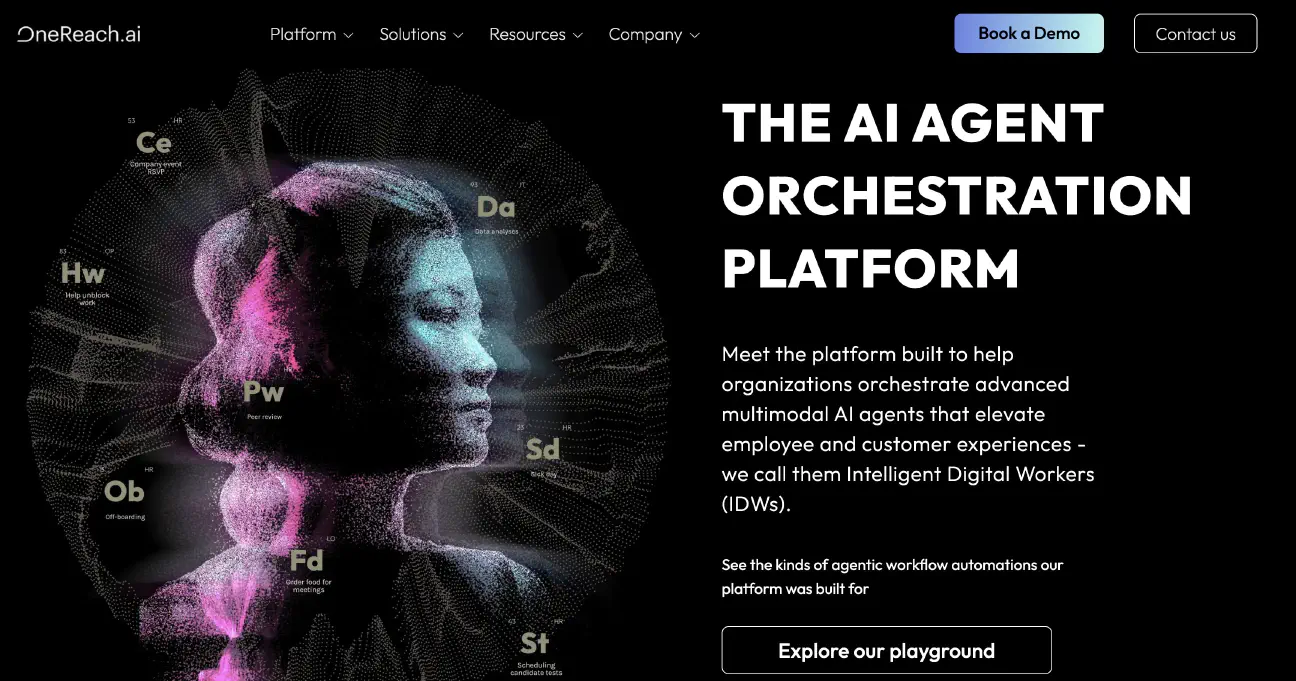
OneReach.ai combines a highly flexible no-code builder with smart automation tools that work across voice, chat, SMS, and IoT channels. It’s often used for internal bots (HR, IT, logistics), but also supports customer-facing use cases.
The platform is built for teams that want control over dialog designs and prefer visible workflows over black-box AI. It supports both simple bots and complex reasoning models, and integrates easily with third-party tools and APIs.
If you want conversational AI software with multimodal capabilities built in as standard, and more than 700 pre-built steps you can use to fine-tune automations, OneReach is a great choice. However, this platform can be a little more complex to use than other systems.
Pricing
Custom; based on users, use case complexity, and integrations. Demos are available for free for beginners.
| Pros | Cons |
|---|---|
| • Visual, drag-and-drop logic builder | • Less focus on prebuilt templates |
| • Strong automation and backend integration options | • Can require training for non-technical users |
| • Omnichannel support (including SMS and VOIP) | • Fewer out-of-the-box analytics tools |
| • Supports structured and generative workflows | |
| • Ideal for internal automation |
13. Yellow.ai: Enterprise-Scale Bots with Generative + Structured AI
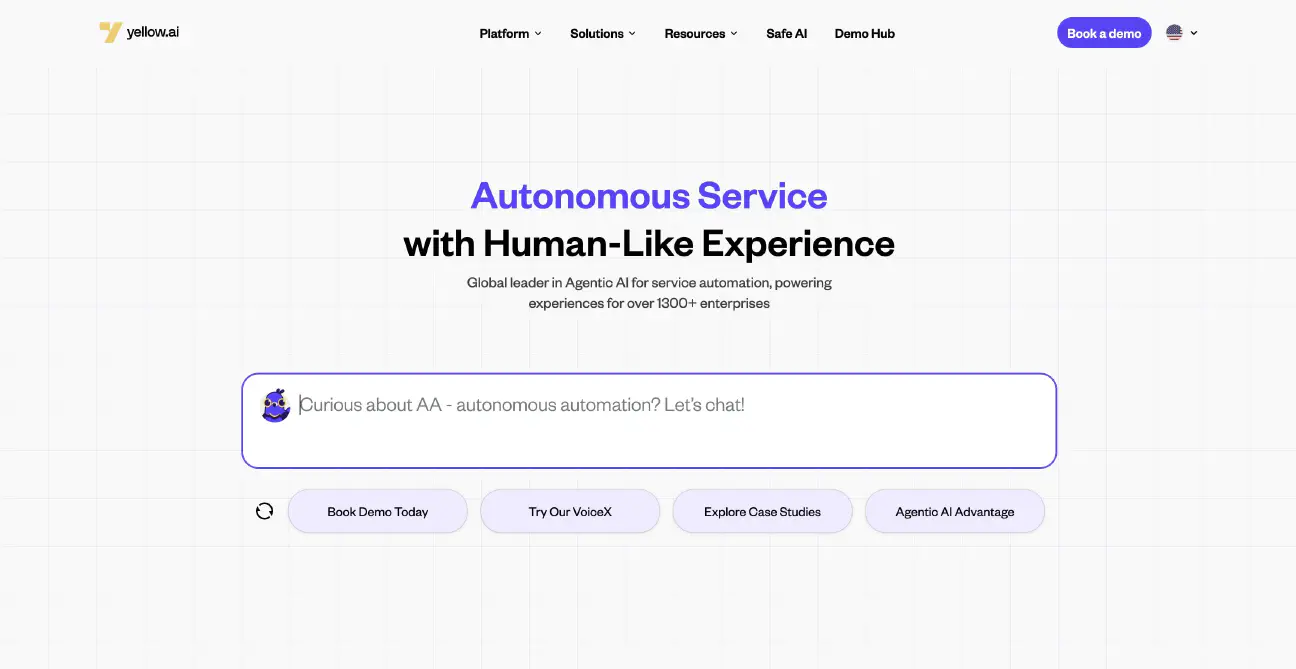
Yellow.ai offers a flexible conversational AI platform designed for scale. It supports 135+ languages, deploys to 35+ channels, and lets companies mix structured workflows with generative AI integration depending on the task.
It also includes self-learning chatbots, real-time conversational analytics, and a vertical focus on industries like retail, banking, travel, and HR. Yellow’s bots can handle both customer-facing and employee-facing workflows, making it useful across departments.
There are plenty of advanced features to explore, such as multi-LLM architecture for custom model integrations, and generative AI automated workflows. You can also experiment with more than 100 pre-built templates for different use cases.
Pricing
Tiered enterprise plans, based on usage and number of channels. Some features are available to try for free.
| Pros | Cons |
|---|---|
| • Powerful hybrid AI setup (generative + logic-based) | • Requires onboarding support for best results |
| • Wide international and channel support | • Some customization features are only available on premium plans |
| • Enterprise-grade analytics and optimization tools | • Pricing can scale fast if not closely managed |
| • AI agents improve over time with feedback | |
| • Excellent for large, multi-region teams |
Open-Source Conversational AI Options and Customization
Not every business wants a plug-and-play AI assistant. For some, especially those with unique workflows or strong in-house dev teams, building a custom AI chatbot using open-source chatbot frameworks is a smarter path.
There are now dozens of open-source tools that offer solid building blocks. These platforms let you choose your own AI model selection, define custom logic, and shape your bot around internal processes. Some of the better-known names in this space include:
- HuggingChat: Built on Hugging Face’s transformer tech, and supports integration with various OpenAI models, LLaMA, or Mistral for more control over tone and reasoning.
- Rasa: Highly customizable, Python-based, and built for teams that want to own every part of the pipeline, from NLU to dialogue handling.
- Botpress: Built for enterprise users looking for low-code/no-code development, but with a clear backend structure that allows for customization.
Customization vs Simplicity: The Trade-Off
Most open-source and highly customizable conversational AI platforms give you more control. But they also demand more time, technical skill, and infrastructure management. That includes everything from configuring your own self-training algorithms to managing user data and API limits.
If you have limited technical resources, the better option might be to look for a solution built for a specific use case (like conversational customer engagement) that supports customization. Many of the solutions mentioned above allow companies to experiment with custom instructions, pre-built integrations, and flexible language models.
Some also allow you to build in your own guardrails for compliance and security, introduce proprietary data to training models, and design specific workflows.


How to Choose the Right Conversational AI Platform
With so many options, from out-of-the-box assistants to fully custom solutions, narrowing it down comes down to use case, team capacity, and budget. Here are some quick tips to help you choose the best conversational AI platform:
Check Performance and AI Capabilities
Start with the brain. Does the platform use large language models (LLMs)? What sort of AI features are supported? Can it understand and respond to contextual conversations, not just single-turn questions? Look for strong NLU, support for generative AI, and logic that holds up over time.
Some platforms offer intent-based routing, real-time processing, or dynamic escalation. These capabilities matter most when you’re dealing with open-ended customer requests or high volumes.
Prioritize Metrics and Testing
You’ll want systems that support ai-driven scoring, in-platform testing, and access to actionable metrics. Think: resolution rates, response time, drop-off points, CSAT trends.
Platforms that include automated quality monitoring and message-level alerts help you stay ahead of issues before they spiral.
Look for Integrations and Ecosystem Fit
If your AI can’t talk to the rest of your stack, it’s not going to help much. Check for native or supported integrations with CRMs, helpdesks, knowledge bases, internal APIs, even scheduling tools.
Some tools offer predefined modules for these tasks; others require manual configuration. Know what your team has bandwidth for. Remember, some solutions are also specifically tailored to the needs of specific industries. That might be useful if you’re exploring the potential of AI in education, finance, healthcare, retail, or another sector.
Consider Channels and Coverage
Most businesses need bots that live in more than one place. ? Does your platform allow you to leverage the power of conversational SMS, AI-driven voice bots, message-based interactions on chat apps, and more?
Some platforms also offer natural language IVR, enabling voice menus that feel more human and less robotic.
Remember Customization and Ease of Use
Even if the tech is solid, your team needs to use it. Look for tools with low-code/no-code development, intuitive builders, and well-documented setup processes. Don’t underestimate training time, either. Some “simple” platforms still require a steep ramp-up.
Think About Security, Compliance and Support
Will your chosen AI solution adhere to TCPA compliance guidelines, AI ethical standards, and other regulations? Are there safeguards in place to protect your data, and minimize the risk of AI bias and discrimination?
If you encounter issues, is the vendor around to help? How responsive is their support team? Do they help with onboarding, compliance setup, and scaling?
Future Trends and Industry Impact
The pace of change in conversational AI platforms right now is fast, and getting faster. Here’s where things are likely heading in the next 12–18 months, based on what’s already emerging across industries.
- From Reactive Bots to Agentic AI: We’re already seeing AI agents evolve into task-completers, not just question-answerers. These tools now use internal logic, business data, and reasoning models to take action autonomously: rescheduling a delivery, pulling reports, even filling out forms.
- Growth of Conversational Commerce: Retail, travel, and financial services are investing heavily in intelligent virtual assistants that both support and sell. Expect more bots that guide purchases, suggest upsells, check availability, and help with checkout processes.
- Smarter Voice and Language Models: Voice-based interactions are catching up quickly, especially with natural language understanding (NLU) and voice assistants becoming more responsive. The rise of multilingual approaches, and even bots that can switch languages mid-conversation is valuable for global companies.
- Sophisticated Discovery and Escalation: Tools like intent discovery bots, which help identify gaps in your knowledge base or track new customer questions, are gaining traction. So are smart agent escalations that pre-fill case info, transfer chat context, and minimize customer effort.
Plus, as the space matures, we’ll likely see fewer niche tools and more unified platforms that cover messaging, voice, support, analytics, and commerce in one stack. There’s also growing pressure for platforms to support open standards, for AI model selection, governance, and portability across channels.
Clerk Chat: The Ultimate Conversational AI Enterprise Platform
Conversational AI platforms give businesses in every industry an incredible way to upgrade their marketing, sales, and customer service strategies. With the right platform, you can create bots that guide and support both customers and employees through countless tasks and processes.
While there are numerous enterprise conversational AI platforms worth considering today, Clerk Chat stands out for a few key reasons. First of all, Clerk Chat is a fully omnichannel solution that allows you to reach your customers and engage them wherever you are.
You can customize your AI assistant to suit your specific business needs, and take advantage of Clerk Chat’s integrations to infuse your bots with valuable, proprietary data. Plus, Clerk Chat is incredibly easy to use, cost-effective, secure, and compliant.
Discover how you can take advantage of conversational AI software to increase sales, improve customer relationships and turbocharge your team’s performance.
Dive into the AI revolution, with Clerk Chat, today.
Alex is passionate about building truly groundbreaking technology that serves humanity. He strives to encourage work environments where teams show up authentically and are empowered to contribute their best work. Before Clerk Chat, Alex built, scaled, and sold Retinad VR, followed by working in partnerships and innovation at Samsung and Netflix, helping enable large-scale projects and products. In his free time you can find him gravel biking and reading philosophy.
In this article:
- What are Conversational AI Platforms?
- How Does a Conversational AI Platform Work?
- Conversational AI Platform Use Cases
- The Benefits of Conversational AI Platforms
- Key Features of Conversational AI Solutions
- Conversational AI Software: Costs and Pricing Models
- Conversational AI Software: 13 Top Solutions for Enterprises
- Open-Source Conversational AI Options and Customization
- How to Choose the Right Conversational AI Platform
- Future Trends and Industry Impact
- Clerk Chat: The Ultimate Conversational AI Enterprise Platform
Ready to use your business number for text messaging?
Thousands of businesses are already experiencing the power of conversational messaging through SMS. Join us. Free trial and paid tiers available.
Get Started#Subscribe
Get product updates in your inbox
Tutorials, features, and Clerk Chat news delivered straight to you.
